Irish, the primary official language of Ireland has been spoken on the island for over 2500 years. Its sentence structure and syntax are very different from that of the English language.
One striking distinction is the lack of words for "yes" and "no" in Irish. Believe it or not this is a fact and you will find many Irish translations for these two little words.

Table of Contents
Differences Between the Irish Language and English
The Irish language is very different to English despite the fact that the island of Ireland is so close to its neighbor. Sentence structure and grammar are not similar at all. Irish is one of the languages of the Celts.
This probably sounds very strange to any English speaking person. How can you have a conversation without these seemingly all important words?
Online Dictionaries
Check this little fact out in the English-Irish dictionary. I like to use Foclóir.ie for as an Irish translation tool.
The also have an Irish-English dictionary known as Teanglann. These are Irish gaelic dictionaries, not Scottish Gaelic.
The answers here are far more accurate than in Google Translate. I find Google's translation software is not very accurate for the Irish language. I do not know of an Irish text translation software that is accurate for Irish Gaelic translation.
These are the two resources I recommend the most for online translation. They include many idioms of the modern Irish language. They are very informative and helpful for the use of students of the Irish language. There are also notes on the etymology of Irish words.
If you check the page above you will find that there is no one word given as the translation for yes.
In fact there are many different forms and ways to answer yes in Irish Gaelic.
How to reply in the affirmative or negative in the Irish language
So how do you answer a question in Irish?
This is usually done by answering with the verb, either affirmatively or negatively. Here are some examples:
An dtuigeann tú?
(Phonetic Pronunciation: On dig-un too)
Do you understand?
Tuigim: Yes - or truly you are saying "I understand".
(Phonetic Pronuciation - Thig-um)
Ní thuigim: No - the exact translation is "I don't understand"
(Phonetic Pronuciation - Nee hig-um)

Ar mhaith leat uisce?: Would you like water?
(Phonetic Pronuciation - er wah lath ish-ka)
Ba mhaith liom: Yes or literally "I would like"
(Phonetic Pronuciation - bah wah lum)
Níor mhaith liom: No or literally "I wouldn't like"
(Phonetic Pronuciation - neer wah lum)
Meaning of the word 'sea in Irish
When some people are learning Irish they mistakenly apply the words "sea" and "ní hea" for the words "yes" and "no."
These are only used to answer a question like this:
An é an doras?: Is that the door?
(Phonetic Pronuciation - on eh on dur-us)
Is é (sea) or ní hé: Yes or no - literally meaning "it is" or "it isn't".
(Phonetic Pronuciation - iss eh (sha) or nee hay)
Expressions of Rural Ireland
Today most people in Ireland speak English, learning it at home, and only learning Irish at school.
However despite adopting the English language, many Irish people still seldom use the words"yes" and "no" when answering a question, even in English.
This is particularly noticeable in rural Ireland.
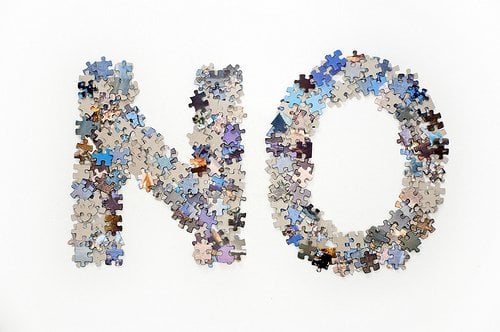
This lack of use of these succinct little English words might be noticed by tourists when browsing in small country shops.
You might, for example, ask a shopkeeper if she has a particular product or brand in stock. It is highly unlikely that you will get a simple "yes" as an answer.
More than likely you will hear a response such as:
"Let me see, now"
or
"I do, of course."
or
"We have loads of them."
or
"I'm afraid not."
If you ever get the "I'm afraid not response", it will generally be followed by a quick, "but I have such and such, which is just as good, if not better."
Usually any response is followed by a story or a few questions about why you might need the particular item.
Maybe the shopkeeper might seem overly inquisitive to the non-Irish national, but all that is happening is the obligatory banter that is needed to start up a grand old conversation.
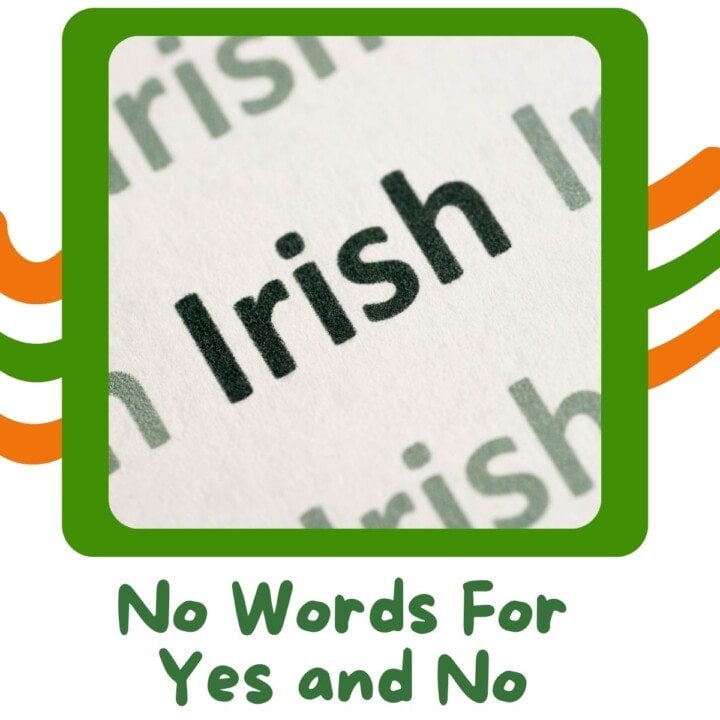
The Joy of Conversation
The Irish dislike those simple words "yes" and "no". They are way too short and to the point.
A plain negative "no" would be just too pointed, giving the impression that the shopkeeper is not in the least bit interested in a good old chat, when you can be certain that a chin wag is always on the cards in Ireland.
Words like "yes" and "no" are too polarizing, too stagnant for the Irish. What kind of a chat can you start with such "useless" little words?
And so, when the Irish started speaking English, they decided not to use words like "yes" and "no" that do nothing to stimulate a good conversation.
If you are an Irish language learner then I hope you found this post helpful. Other good resources are Duolingo, Bitesize Irish, and All About Irish.
I do not know if this little fact holds true for the other Celtic languages like Breton, Welsh, Manx and Scottish Gaelic.
It does hold true for all of the major dialects of Irish spoken on the island of Ireland, whether in Munster, Connacht or Ulster.
Here are some other posts you might enjoy...
Knocknarea And Queen Maeve of Connacht.
Learning About Your Irish Family Ancestry
Tips for Learning the Irish Language
Thanks for following my recipes and ramblings.

Slán agus beannacht,
(Goodbye and blessings)
Mairéad -Irish American Mom
Pronunciation - slawn ah-gus ban-ock-th
Mairéad - rhymes with parade


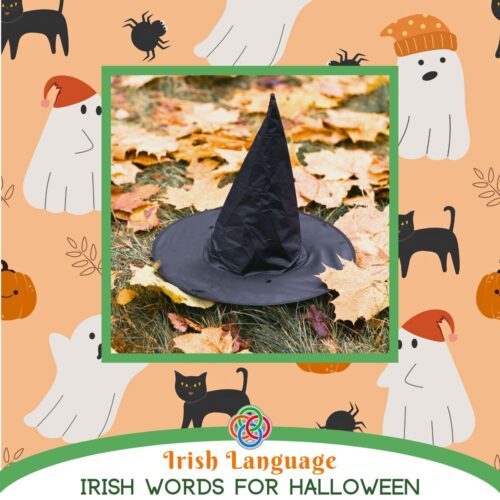



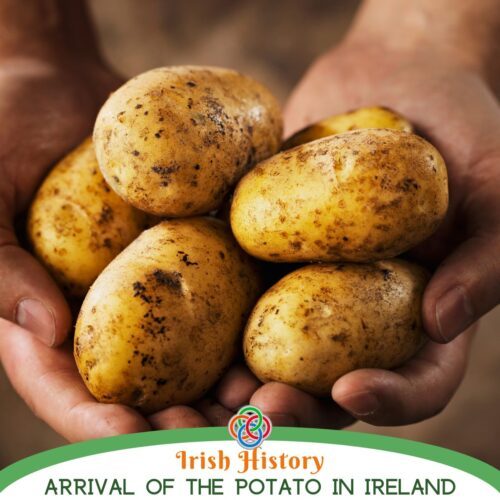
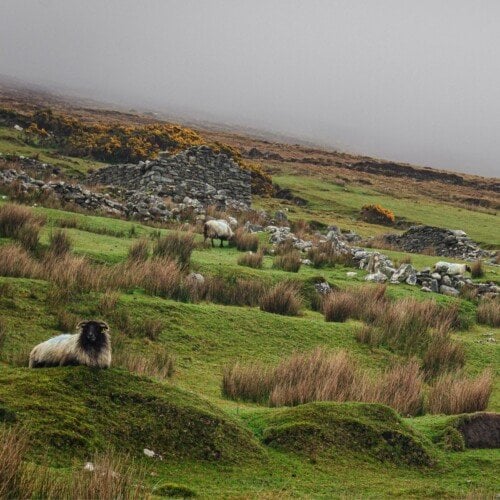






Melissa
I studied Irish in New Hampshire a number of years ago, and getting used to not having a simple "yes" or "no" was very difficult at first. (Sadly, since I didn't have the opportunity to use it very often, I lost most of it, though I do keep meaning to work on it again.) Amusingly, I realized as I read this, that it must have sunk in very well, as I rarely use them in English now, but instead use things like "Unfortunately, I don't have...", or "I do have...", etc. I never noticed until now!
Irish American Mom
Melissa - Thanks for stopping by my website. It is lovely to hear that you studied Irish. It is a fairly difficult language to learn but truly lyrical. It's funny how you noticed how you don't say yes and no so much anymore. It is a difficult concept when learning Irish, but definitely affects our turn of phrase when speaking English. Thanks again.
Mairead
Brian@irelandfavorites
Greetings and salutations Mairead,
I always enjoyed your explanations of why or how things come to be. I've attempted to learn a phrase or two of Irish, but to no good results. A nice chat , now that Ive enjoyed on both coasts of the Atlantic, with for the most part positive results. Keep the air conditioner on,
Cheers,
Brian.
Irish American Mom
Brian - I am glad you are enjoying my theories on all things Irish. I am sure many scholars may not agree with my conclusions, but its just a little food for thought. Glad to hear you have had many a nice chat on both sides of the great pond.
The air conditioners are running full blast here in Kentucky. A "cool" front has moved through dropping our temperatures from the low 100's to the mere 90's. My five year old asked why he can't go to Ireland this year, because "it's too hot here". Hope it isn't as sweltering in your neck of the woods.
Mairead
Brian@irelandfavorites
Hi Mairead, I was lost on some backwoods in Maine a while back and stop to ask for directions in an old auto repair place, I asked this old Mainer if I could go right at the fork in the road to get to my destination,
he responded "you could, wouldn't do you much good though" the following conversation lasted for a good half hour and is one of my all-time favorites. Anyway just thought you'ld enjoy that, The summer here has been one of the best, we live near the coast and always have the option of taking a dip.
Irish American Mom
Brian - I love the old man from Maine's response. It seems you too have inherited the Irish love of a good chat. I find that here in Kentucky people love to stop and talk, too. I think it's one of the reasons I like living here so much.
damhnait Nic Enri
fascinating website mairead has an irish common sense and enables her to think because the english language is learn by heart never reason out what youre saying a so dulls the brain andstops the capacity to explain yourself. so english people are very bad teachers. and they always put the irish down.this is also an english way to suppress any opposition to government. dermot henry resident in new york writes songs in english and irish. he is a native of county sligo and is my brother. slan abhaile is bmy favourite song. gura mile maith agaibh go leir . slan go foill. damhnait.
Irish American Mom
Go raibh míle maith agat, a Dhamhnait. I love your take on the common sense and reasoning that is embedded into Irish language. Plus there are many names for the same English noun in Irish. I am reading the book "32 Words for Field" at the moment and it is fascinating. The Irish language is lyrical and expressive. Thanks so much for stopping by to check out my ramblings.
All the best,
Mairéad
Grammy
Fascinating! I have a question....what is the difference (if there is one) between speaking Irish and Gaelic? I've always wondered that....Here's another: Is it Celtic with a hard C (like cat) or Celtic with an S sound? My, it's good to have an Irish friend that I can finally ask these questions! 🙂
Irish American Mom
Hi Grammy - Irish is a Gaelic language. The other Gaelic languages include Scottish Gaelic, Welsh, Manx (spoken in the Isle of Man) and Brythonic Gaelic from Cornwall and Brittany in France. These languages all share certain similarities. In Ireland we say Irish when talking about our form of Gaelic language. Here in America the word Gaelic is often used to describe the Irish language, but all of these languages fall under this term.
When saying the Celts or describing the Celtic people we use a hard C for pronunciation. The only time we use the soft C or S sound is when referring to Glasgow Celtic football club, just like the Boston Celtics have a soft C.
Hope this helps. So glad to be able to answer some of your Irish and Celtic questions.
Grammy
It does, Thank you!! My confusion is all cleared up 🙂
Clare Mcclure
Gaeilge is the form of Gaelic language spoken in Ireland. We would generally say Gaeilge in Ireland if saying we speak Irish. "Irish" is the English translation for "Gaeilge". Ta Gaeilge agam.xx
Irish American Mom
Hi Clare - Tá Gaeilge agamsa freisin. Thanks for explaining the differences between Gaeilge, Gaelic and Irish. It's a difficult one to grasp for many Irish Americans. And for that reason, I sometimes am lazy and just say Gaelic in my blog posts. Perhaps I should write a blog post on this topic and then link to it whenever I use the term Gaeilge. Another good post I could write might be to explain what the Gaeltacht is. Thanks so much for the inspiration.
All the best, and thanks for stopping by.
Mairéad
Cheryl Barker
Maired, how interesting! Fun to hear how the Irish want to keep the conversation going so just avoid yes and no. Thanks for another peek into all things Irish!
Irish American Mom
Cheryl - The Irish are great talkers. Whenever I go home I really take note of how much people love a conversation, even with strangers. I think that is one reason why tourists love Ireland so much.
Corinna O'Brien
How right you are - yes or no are not well known concepts in Ireland. They wouldn't be, would they.... 🙂
Irish American Mom
Corinna - A chat is always on the cards in Ireland, so no point using a simple yes or no as an answer. Sometimes I miss friendly chats with strangers from my days in Ireland. All the best!
Mairead
Joy
Mairead- I'm SO glad I read this article. I'm part Irish, and it really explains a lot about why I like to talk as much as I do. I thought I just inherited it from my parents. lol
And, it also explains why I tend to not always give a straight answer when asked a question. I, too, feel like just a 'yes' or 'no' is too short sometimes. Don't get me wrong, I do tend to give just a 'yes' or 'no' answer sometimes. But often-times, I will give a longer answer to a simple question. It really bugs my husband sometimes, because he's of the "just get to the point" school of thought. lol And I tend to want to give an answer, and then explain why I gave the answer I did. lol
I really like your site by the way. It's really interesting to read about the land of my ancestors (Johnsons and Morgans/McKays). I hope to one day go back and actually visit Ireland. The last time I was there, it was just for a layover when I was leaving Italy to move back to the States (my dad was in the U.S. Army). My dad and I were at the Shannon Airport for about 45 minutes, so we didn't really have time to get out and take in the view. But it was cool to hear the dialect of the locals who worked there. 🙂
Irish American Mom
Joy - I am so happy you found my site. I too seldom use 'yes' and 'no', but answer with a sentence most of the time. It definitely is part of our heritage. I hope you make it to see Ireland some day. It really is beautiful. Come back and visit whenever you get a chance.
Best wishes,
Mairead
language school Ireland
Tremendous things here. I am very glad to see your post.
Thank you a lot and I'm taking a look ahead to get in touch with you. Will you kindly drop me a mail?
Irish American Mom
Glad you enjoyed this post.
All the best,
Mairéad
sam
Doesn't sea mean yes
Irish American Mom
Sam - Technically "sea" is short for "is é" which mean's "that's it". Over the years many of us who only learned Irish at school, and are not native Irish speakers, started using "sea" to mean "yes". So if we accept that all languages evolve and change, then in modern times we might agree that "sea" now means "yes". Thanks for checking out my post and commenting.
All the best,
Mairéad
Luke
What about Tá and Níl
Irish American Mom
Hi Luke - 'Tá' technically means 'it is' and 'níl' means 'it isn't'. In today's Irish we use these words to mean yes and no, even though they may not have been used in this way many years ago.
Thanks for pointing this out.
All the best,
Mairéad
Teddie
Is there a good website that will teach Irish accurately that is free/cheap that you know of? I've always learned sea and níl, but recently learned that's not the case and I want to be able to learn this beautiful language correctly. Thanks!
Irish American Mom
Hi Teddie - I recommend Bitesize Irish Gaelic. This is a program developed by a native Irish speaker and the audio guides are excellent for correct pronunciation. Unfortunately it's not exactly cheap. It starts at $15 per month, but this does not include audio lessons. With the recorded lessons, listening to a native Irish speaker, the price goes up to $25 per month. Here's the link for their website ... http://www.bitesize.irish/
I hope this helps.
All the best,
Mairéad
Skibopbkli
Duolingo is actually quite good. I myself am fluent in Irish and a lot of the things they teach are spot on, with the exception of a few pronunciations. It's a free app too, so there's that.
Irish American Mom
Thanks for the tip about this language learning app. Nice to hear the pronunciations are good on it.
All the best,
Mairéad
Danii Power
Hi there, born and raised In Ireland and i loved your article but we do have flat yes and no answers. They're "tà" which is yes and "nìl" which is no. Seà also mean yeah as a casual way of saying yes.
Irish American Mom
Hi Danii - In modern Ireland we have started using "tá agus níl" for the words yes and no. However, these words technically mean "is" and "is not." In old Irish there were no words for yes and no, but today we'll go with the modern ways and use 'tá agus níl" and just make life a little easier. Thanks so much for adding to our conversation about the Irish language.
Mairéad